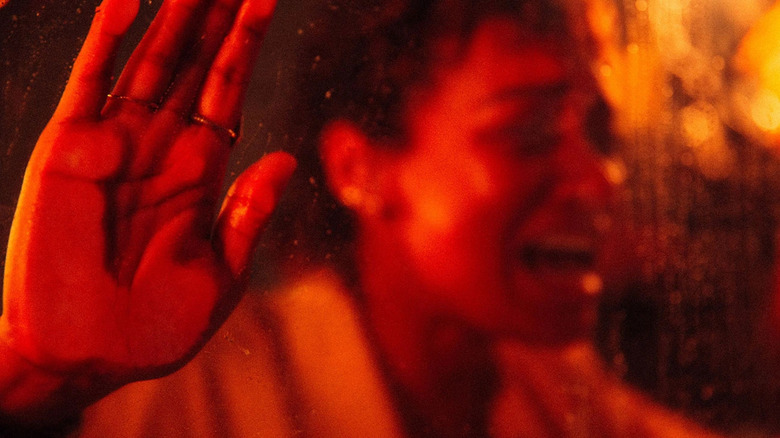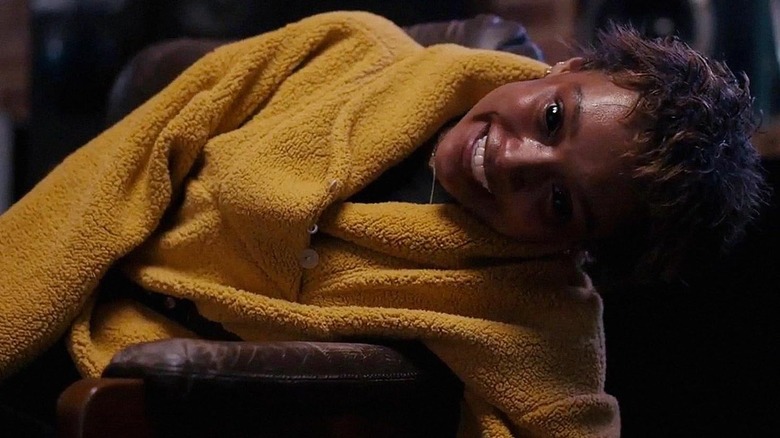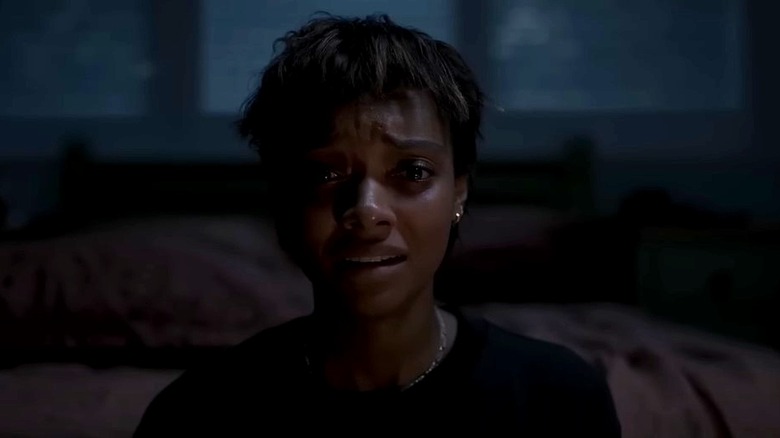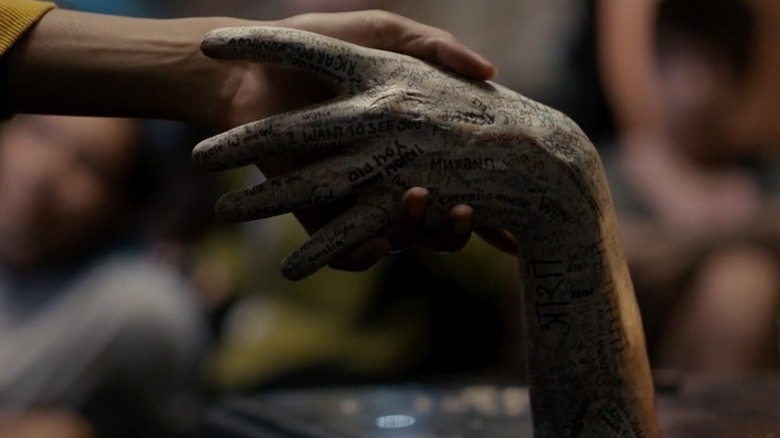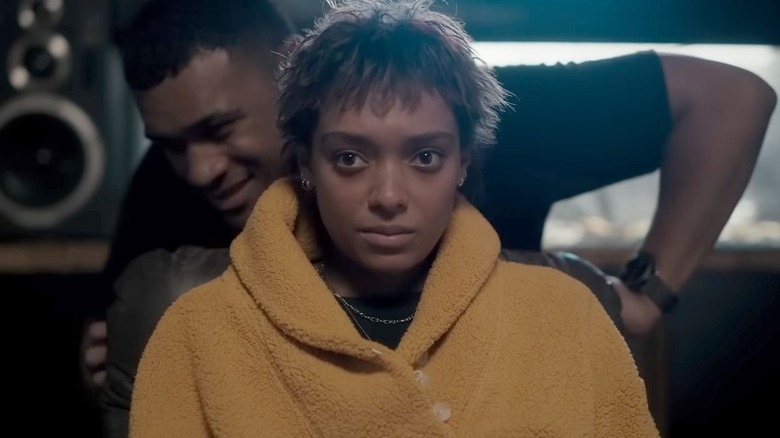How The Directors Of Talk To Me Went From YouTube To Making The Scariest Movie Of The Year [Exclusive Interview]
"Talk to Me" is the scariest horror movie of 2023. It's also the feature directorial debut of brothers Danny Philippou and Michael Philippou, who cut their teeth on YouTube before launching themselves onto into the theatrical realm with the most astonishing horror debut since Ari Aster's "Hereditary." And like that 2017 film, "Talk to Me" was scooped up from the festival scene by A24, who are unleashing this utterly terrifying film upon unsuspecting mass audiences with a wide release this week.
Like many of the best horror movies, "Talk to Me" is steeped in metaphor, telling the story of a group of teens who experiment with ghostly possession as a party activity. Naturally, it goes wrong. Deeply wrong. Horror movies this fast-paced rarely feel so powered by dread, and horror movies this unflinching are rarely so ... fun to watch. It's a high-wire act.
So, how did two YouTubers from Australia make a movie as terrifying as "Talk to Me"? And how did they infuse it with a proper "teen movie" energy that makes its characters all-too-relatable before they're sent straight to Hell? I spoke to the Philippou brothers head of the film's release via Zoom to get to the bottom of it. Along the way, they shared stories about making A24 jokes on set (before A24 acquired the film), how they crafted the film's many effective scares, and which YouTube filmmaker you really, really need to be watching.
Note: This interview has been lightly edited for clarity and brevity.
'I hadn't seen Australian suburbia or teenagers that felt and spoke authentically on screen'
What's stuck with me since I saw "Talk to Me" at SXSW earlier this year is how effective the film is as a teen movie, as a movie about troubled kids dealing with life, as well as an effective horror movie. How did you approach it as a teen film? How much of that was on your mind as you were constructing this story?
Danny: I just looked at the characters and just tried to capture Australian youth a little bit and sort of put them on screen. I think we've seen a lot of amazing outback films or beachside Australian films, but I hadn't seen Australian suburbia or teenagers that felt and spoke authentically on screen. It seemed to be a rare thing. So a big part of that was finding and casting the right people that felt natural to the roles as well, and just to make sure that we weren't casting people that ... we were just casting because of names. We really wanted them to feel real to the characters.
Can you talk about working with the younger actors? It's a very, very intense film, but it's also very naturalistic in how they seem to handle their situation. How do you speak to your actors to get the performances that you wanted in this situation?
Danny: Each actor is different and then they need different things for, say, when we're doing the serious scenes. So it's a lot about seeing how they like to do it and catering to their needs, but then also adapting the screenplay if we need to so the words work in their mouths in the way that they want to express it. Like in the rehearsal process, we're really full-on with them and just go through every single line of dialogue and beat out everything and really get a feel for them and how they perform and how they would naturally say some of those lines. It was just being really collaborative with the actors.
You come from YouTube. You come from a world that's still relatively new. It's just the new film school for a lot of people. Can you talk about the tools and craft you learned from that world that you brought with you to feature filmmaking?
Danny: Well, everything you make, you learn something. So we do videos just to try new things out. Like, "Oh, we want to do a set that's sinking," or "We want to do a fight scene with this rig that we designed with the stunt performers." It was a way to create while also learn at the same time.
Michael: Yeah, really finesse editing techniques and pacing. It was just pretty much, you learn with every single video, so it was a film school.
Danny: But we were lucky enough that we had worked on film crews before YouTube. So we had worked on half a dozen films before YouTube, so we understood what we were getting ourselves into and what that world looked like.
'I think the scares maybe work a bit more because you understand the consequences of what's happening...'
What was the biggest jump, like the one thing you didn't see coming when you made the jump from working for YouTube to making a feature film?
Danny: Probably the music was a bigger task than I thought. It was a bit of a difficult process finding the sound that we did in the end. But moving on to the next film, I want to have that start earlier and have the music ingrained in the bones of the script. So we've been sending stuff off to composers that we're writing now, so we can try and find a sound earlier as opposed to just trying to find it at the end.
I literally didn't spend a moment of this movie not uncomfortable. What choices did you make in how you framed your scares? How do you know when one scare is a background scare, this one is a jump scare, or this scene is a constant state of dread?
Danny: It was all in that pre-production process as well, even early on when we were writing the scripts, it was beating out and storyboarding and shot listing. And then that went to a whole other level when the [director of photography] finally came onto set. We were able to bounce back and forth and we're just literally shooting scenes on our iPhones and editing them together. Just seeing what worked, even from a framing perspective. So it was all buildup and practice and finding that visual language in [pre-production].
Michael: Then also having the scares and things come from character. So all those jump scares, it's not relying on external sources that are not tied to the character in some way. It's not just out of nowhere that these things happen, we're all kind of tied to the character. I think the scares maybe work a bit more because you understand the consequences of what's happening to their friends and the world around them.
The movie has this interesting balance where it's incredibly fun and fast-paced, but also deeply unpleasant in the way that you'd want a really intense horror film to be. How do you find that balance?
Danny: All the editing process is covering the scenes and the writing. What you find in the editing process is there's a lot of stuff that you can convey with just looks and emotions. You don't have to necessarily say all that dialogue, and it's not moving through at a pace that it feels like it lingers. What's the latest time that we can cut into one of these scenes, the earliest we can cut out? Just experimenting with all that stuff in the edit.
Michael: Originally the director's cut went for like 20 minutes longer, but it's kind of finding what's integral to the story. And I guess maybe that's the thing from YouTube as well — we don't want the audience to get bored in any way.
'There's no f***ing way they're going to buy it'
Getting a movie released by A24 has become the badge of honor for the modern indie horror filmmaker. Did you make your movie with the A24 audience in mind, the "Hereditary," "Midsommar" audience in mind?
Danny: No, no, no. It was just to make a film that we just for sure ... it wasn't an A24 film. When they said A24 was coming to the screening when they were looking at buying and stuff, I'm like, "There's no f***ing way they're going to buy it." But it was constantly a joke on set, it was very A24. That's very Sundance.
Michael: If we were arguing on set, we'd say, "That's not very A24 of you to be lingering on that shot like that." We really respect them, they're like a prestigious company, and we never thought that we'd fit inside that bracket. So the fact that we were at Sundance and they were pitching themselves to us was completely surreal.
Danny: When we had that initial meeting and they were talking about it, I said, "I'm nervous for it to be presented by A24." Because I'm like, I don't feel like ... yeah, I felt embarrassed. The audience seems so sophisticated, I'm scared, I feel dumb.
But I'm assuming you have seen the film with enough audiences now that you know that it holds its sway over people. Has it gotten easier for you to have faith in yourself to have faith in your movie?
Danny: Every time I watch it with audience, I'm like cringing and freaking out. And then as the film progresses, I calm down a bit more, but there's always a big nervous energy for watching with people.
Michael: We have a bio on YouTube and it's called "Wannabe filmmakers on a rampage." I don't think we've lost that "wannabe" yet. We're still wannabe filmmakers, I feel, at this time.
What's the moment in the film where you watch it and go, okay, that's the moment that proves we're not wannabe filmmakers? There's got to be a moment in the film where you feel that.
Danny: I think that the reaction to the Riley attack, and then building up to a moment where a character is attacked ... there's always a beautiful visceral reaction from the crowd and the audience is electric. You can feel that something special in the air.
Michael: When you're watching with an audience, you hear beats slamming, like the comedy and the horror. If there's movement and there's like chatter or gasps or laughs, that's when you feel like, "Okay, they're connecting with the film." If it was completely silent, we'd be terrified.
Danny: The audience has been so responsive, it's been amazing.
'I think I will always return to horror'
What are some movies that inspired you? What movies, both horror and not, should people watch alongside yours?
Danny: "The Exorcist," "Let the Right One In," "Memories of Murder," "The Vanishing."
Michael: "Return."
Danny: Yeah, those films feel pretty good.
Let's pick at random. Let's pick "Memories of Murder." What about that film did you draw from?
Danny: The way that Bong Joon-ho is able to merge tone. He's able to go to horror, to drama, to comedy in a matter of minutes, and it all feels like one coherent piece. It's blending genre seamlessly, which he's a master of.
Are you guys happy being horror guys? When I interviewed ["Hereditary" director] Ari Aster, he made it very clear to me he liked horror, but he didn't want to be a horror guy forever. Whereas other directors are like, "Horror for life!" Where do you feel you fall?
Danny: I think I will always return to horror. But we want to experiment with different things. Like, we really want to do an action film as well. We've written a romantic comedy. I don't know, I just like to jump around and tell the story that's exciting us the most at that time.
Michael: Yeah, I feel like we want to tackle different genres, but horror has always been ... it's the first thing that we've loved when we were kids, and it's the first genre of stuff that we liked as kids was horror. So it's always going to be with us and we always want to do it, but definitely don't want to be just tied to horror.
Having seen "Talk to Me," I have to hear about what the hell kind of romcom that you two would write.
Danny: Well, me and Michael don't write together, just so you know. I wish we ... [jokes] it sucks that we have to do press tours together, we do not enjoy each other's company. Yeah. But yeah, it was just a personal, fun, romantic comedy story that I've put out, but I don't think I'd want to direct that next. I'm not comfortable directing that yet.
Michael: Oh, we've got a coming of age thing as well.
Danny: Yeah.
Michael: More coming of age adventure one, as well. Yeah, a bunch of different genre stuff.
I'm increasingly impressed by the quality of the storytelling and the technical craft that people are bringing to online videos. What advice would you give people who are working on TikTok, on YouTube, and creating their films there? What should they be doing to become storytellers as opposed to just, you know, content creators?
Danny: I think that constantly experimenting with their craft online and not letting low views or anything make you feel sad or whatever, 'cause people can always return to that video, and over time a video can get an audience and find its audience. So it's like, just constantly make stuff, 'cause you constantly keep improving. And then also on the side, if you can, be trying to work on that bigger thing and always be chipping away at a bigger project, like a feature film script. That's the first step of trying to get into the feature film side, is just to have a solid script that you can start showing people.
Michael: And there's a weird stigma that comes from being a YouTuber. But I feel directors from the past generations, if YouTube was a thing, they'd be uploading to it. It's a way to access and interact with an international audience. If we didn't have YouTube, we'd go the route of climbing the ladder of short films. Whereas YouTube gives you a whole other way to do it, and I hope that this film shows that YouTube stigma shouldn't really be a thing. If you're a storyteller, you're a storyteller. It doesn't matter what medium you come from.
I feel like between "Talk to Me" and "Skinamarink," there's this generation of filmmakers who are just emerging from this world, that's really exciting. Is there anybody else who we should have our eye on?
Danny: Oh yeah, there was one guy that we — I think his name is... D-E-G-O. Is that his name?
Michael: Diego, Dego?
Danny: Dego? Let me quickly double check this.
Michael: This guy's really cool. We love him. He's recent. We found him and we were like, "Whoa."
Danny: He's very creative and he's got a dark tinge on as well.
Michael: I'm going to find it, I'm going to find it, I'm going to find it.
Danny: It's Dego. D ... D-E-G-O? Sorry, we'll give him a good shout out. Yeah, D-E-G-O. Dego.
Michael: Dego Boop. Dego Boop. B-O-O-P. You should watch his stuff.
"Talk to Me" hits theaters on July 28, 2023.
